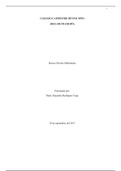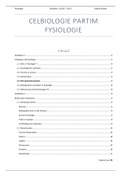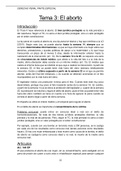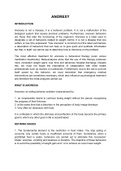GLOBAL CITY REGION BRUSSELS
SUMMARY – MAXIME LERMYTE
2020-2021
Inhoudsopgave
1
,Global city region Brussels Maxime Lermyte 2020-2021
CLASS 1: INTRODUCTION........................................................................................................................7
1. The relevance of global city-regions?.................................................................................................7
1.1 Relevance of cities & urban governance research........................................................................8
1.2 Systemic transition: the demise of the nation state.....................................................................8
1.3 Defining a global city.....................................................................................................................9
2. Why focussing on Brussels?................................................................................................................9
3. Why focussing on (political) structural problem zones?...................................................................10
3.1 Brussels as a problem in Belgian politics?...................................................................................10
3.2 Politico-linguistic conflicts & conflict management....................................................................11
4. Key concepts: theories of urban politics...........................................................................................11
4.1 Pluralism.....................................................................................................................................11
4.1.1 Robert Dahl: who governs?..................................................................................................11
4.1.2 Pluralism in the Brussels political system?...........................................................................12
4.2 Elite theory & the urban growth machine..................................................................................12
4.2.1 Eurocrats in Brussels: non-entrepreneurial power elite groups..........................................12
4.3 Regime theory............................................................................................................................12
5. European cities as sui generis category? Three typical traits............................................................13
6. Conclusion........................................................................................................................................13
CLASS 2: DEFINING BRUSSELS: FACTS & FIGURES.................................................................................14
1. The historical territory of Brussels....................................................................................................14
1.1 The historical expansion of the city of Brussels: an aggressive policy of territorial consolidation.
..........................................................................................................................................................14
1.2 Centre-periphery relation with the Brussels agglomeration.......................................................15
2. Defining Brussels: administrative & functional boundaries..............................................................15
2.1 The political-administrative delineation of Brussels...................................................................15
2.2 Conception of the (fixed) language border (1932-1958).............................................................16
2.3 Language border as tool of conflict management......................................................................16
3. Paradox of Brussels: a rich city housing poor inhabitants.................................................................16
4. Centre-periphery relations...............................................................................................................17
5. Triple segregation in Brussels...........................................................................................................18
CLASS 3: POLITICAL CLEAVAGES & CONFLICT MANAGEMENT TOOLS..................................................19
1. Perceptions of the self & the other..................................................................................................19
2. Political cleavage theory...................................................................................................................20
2.1 Polarization & particracy.............................................................................................................20
3. Political parties (in a pacification democracy)..................................................................................21
2
,Global city region Brussels Maxime Lermyte 2020-2021
3.1 Regionalisation of the party system (1968/1978 - …).................................................................22
3.2 Issues regarding the role of political parties in multilevel governance settings..........................22
4. Intensity of the politico-linguistic conflicts.......................................................................................22
5. Relevance of state design & political culture/practices: conflict management practices.................23
5.1 Pacification democracy: horizontal power sharing.....................................................................23
5.2 Federalism: power sharing over vertical tiers.............................................................................24
6. Depolarization of the politico-linguistic cleavage & the emergence of a new (territorial) identity.. 24
6.1 Bypassing the politico-linguistic cleavage in Brussels.................................................................24
6.2 Realignment of cleavages...........................................................................................................25
CLASS 4: BRUSSELS, A CITY OF MINORITIES?........................................................................................25
1. Brussels in the long 19th century: immigration patterns & language repercussions.........................26
1.1 Urbanization in Belgium/Brussels in the 19th century................................................................26
1.2 Language (policies) intertwined with nation-building.................................................................27
1.3 19th century Brussels/Belgium: traits of unequal languages.......................................................28
1.4 19th century Francization of Brussels..........................................................................................28
1.5 Features of 19th century language and social integration...........................................................29
2. Inter & post war migration patterns in Brussels...............................................................................29
2.1 20th century immigration patterns in Brussels............................................................................29
2.2 Brussels: the diverse nature of international immigration.........................................................30
3. The impact of immigration on the (current) political model: zoom on 3 policy issues.....................30
3.1 Declining knowledge of the official languages............................................................................31
3.2 Countering fiscal stress (targeting the middle class?).................................................................31
3.3 Representation...........................................................................................................................31
4. Concluding........................................................................................................................................32
CLASS 5: LANGUAGE AS A TOOL OF POWER.........................................................................................33
1. Belgium, one country with two democracies?..................................................................................33
1.1 Perspectives on nations and nationalism....................................................................................34
2. Frenchification in Brussels: drivers & mechanisms...........................................................................34
2.1 Frenchification: 19th century pull factors in Brussels.................................................................34
2.2 Language use: competing principles...........................................................................................35
3. Long live Belgium/ Belgium is bursting. Managing the structural linguistic problem zones: tools &
mechanisms..........................................................................................................................................35
3.1 Defusing the conflict through legislation – Pre WWII Brussels...................................................35
3.2 Towards a territoriality of language use? – Post WWII milestones of language legislation........36
4. Language surveying in Brussels: the issue of the censuses...............................................................37
3
, Global city region Brussels Maxime Lermyte 2020-2021
4.1 Language surveying: methodological..........................................................................................37
5. Surveying the socio-linguistic reality? The political goals of ethno-linguistic enclosure in Brussels &
its periphery.........................................................................................................................................38
CLASS 6: LANGUAGE USE, ATTITUDES & IDENTITY ISSUES...................................................................40
1. Markers of altering identities & allegiance? The case of contested Belfast......................................40
2. Polities and their symbols in Brussels...............................................................................................40
2.1 Polities with a legislative assembly in Brussels...........................................................................40
2.2 Who is who?...............................................................................................................................41
2.3 Flags as representation of…?......................................................................................................43
2.4 Brussels as a battleground of competing identities....................................................................43
2.5 Battle for the flag? The Flemish celebration of 11 July...............................................................44
CLASS 7: INSTITUTIONAL ARCHITECTURE & POLITICAL PRACTICES......................................................45
1. Dimensions of the transition of urban governance in Belgium/Brussels..........................................45
1.1 Dimensions of urban politics in a multi-layered setting..............................................................45
1.2 Drivers for transition in Belgium? Criticism on the pacification democracy-model....................46
2. Belgium: from a unitary to a federal state & the role of Brussels’ politicians...................................46
2.1 Belgian state reform features 1970-2012...................................................................................46
2.1.1 Central state machinery: political discretion.......................................................................47
2.1.2 Political autonomy for regions & communities?..................................................................47
2.1.3 Budgets: propelling the meso-level.....................................................................................49
2.1.4 Budgets follow the devolution of competences: the rise of the meso-level........................49
2.2 Brussels framed between 2 peripheries?...................................................................................50
3. The Brussels sub-state machinery....................................................................................................50
3.1 Implementing pacification democracy: architecture & practices regional institutions...............50
3.2 Political practices regional assembly/parliament.......................................................................51
4. Policy orientation of the Brussels Capital Region.............................................................................53
CLASS 8: URBAN GOVERNANCE: THE FUNDAMENTAL ROLE OF THE LOCAL GOVERNMENT LAYER.....54
1. Brussels: the role of the local government layer – 4 contextual traits..............................................54
1.1 The spatial variation in political representation.........................................................................54
1.2 The personalisation of municipal power: the role of the mayor.................................................54
1.3 Pacification democracy at grassroots level.................................................................................54
2. Debates regarding grassroots politics in Brussels.............................................................................55
2.1 Too many public entities and too many public decision makers?...............................................55
2.2 Municipalities = wasteful spending?...........................................................................................57
2.3 A rigid organisation dating from the 19th century?....................................................................57
4










